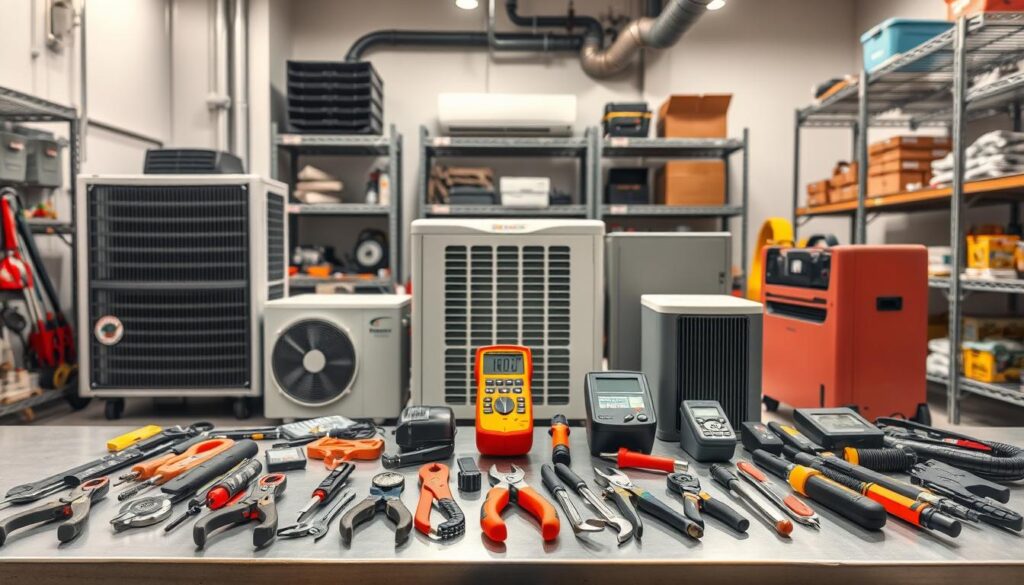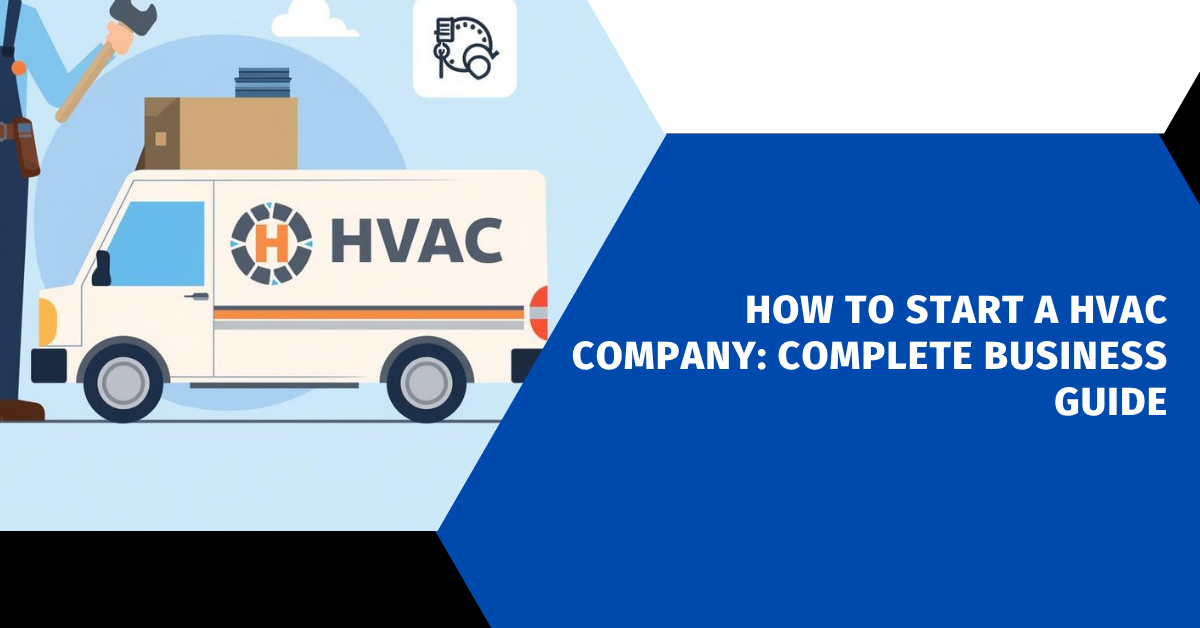Affiliate Disclosure
HVAC Guide Guys is a participant in the Amazon Services LLC Associates Program, an affiliate advertising program designed to provide a means for sites to earn advertising fees by advertising and linking to Amazon.
How to Start a HVAC Company? Are you ready to turn your technical skills into a thriving HVAC business? This business could bring in a lot of money in a growing market.

The HVAC industry is a great chance for entrepreneurs to make a lot of money. The global HVAC market is expected to grow from $281.7 billion in 2024 to $389.9 billion in 2029. Starting an HVAC business is more promising than ever.
This guide will take you through every important step of starting a HVAC company. You’ll learn about market dynamics and how to create a strong business strategy. You’ll get insider tips to make your professional skills into a successful business.
Whether you’re an experienced technician or a new professional in the HVAC field, this guide is for you. It shows how to start an HVAC business in today’s competitive world.
Key Takeaways
- Understand the massive growth potential in the HVAC industry
- Learn comprehensive steps for launching your HVAC business
- Discover essential requirements and qualifications
- Develop a strategic business plan tailored to HVAC services
- Navigate licensing, certification, and insurance requirements
- Explore effective marketing strategies for HVAC companies
Table of Contents
Understanding the HVAC Industry and Market Potential
The HVAC industry is growing fast and full of chances for new businesses. Your hvac business plan should start with knowing the industry well. This includes its current state and how it might grow.
The HVAC field has seen big growth thanks to new tech and a need for energy-saving systems. If you’re starting an HVAC business, you can tap into several important market trends.
Current Market Size and Growth Projections
Recent studies show great potential for HVAC businesses. The market was worth USD $149.80 billion in 2022. It’s expected to hit USD $215.23 billion by 2029. This big increase means lots of chances for new entrepreneurs.
- Global market value expected to increase by 45% in seven years
- Growing demand for smart and energy-efficient HVAC systems
- Expanding residential and commercial construction sectors
Industry Trends and Opportunities
Your hvac business plan should include the latest trends changing the industry. Key trends include:
- Smart home integration
- Sustainable and eco-friendly cooling solutions
- Advanced climate control technologies
- Remote monitoring and diagnostic capabilities
Target Market Analysis
Successful HVAC businesses know their customers well. Look for profitable market segments like:
- Residential homeowners
- Commercial property managers
- Industrial facilities
- Institutional buildings
Doing deep market research is key to making a strong hvac business plan. It helps meet specific customer needs.
Essential Requirements and Qualifications
To start an HVAC company, you must meet certain professional standards. You need to know the hvac contractor license requirements and hvac certification requirements well.
First, you must go through educational and certification steps to become an HVAC technician. This path includes training programs and special credentials that show your skills.
- High school diploma or equivalent educational background
- Vocational training in HVAC systems and technologies
- Completion of accredited HVAC certification programs
- Practical apprenticeship experience
EPA certifications are key for HVAC professionals. They prove you know about environmental rules and how to handle refrigerants.
Different EPA certifications are available:
- Type I: Small appliance refrigeration
- Type II: High-pressure refrigeration systems
- Type III: Low-pressure refrigeration systems
- Universal: Comprehensive refrigerant handling certification
Getting apprenticeships and continuing education boosts your skills and reputation in the HVAC field.
Explore Our HVAC Shop
Looking for top-rated HVAC tools, parts, and accessories? Visit our shop and find the perfect solution for your needs.
Visit the ShopHow to Start a HVAC Company: Key Steps and Planning
Starting an HVAC company needs careful planning and smart decisions. People starting in the heating, ventilation, and air conditioning field must follow key steps. Knowing the basics of starting up can really help you succeed.
Your journey starts with thorough preparation and smart thinking. The first steps of starting an HVAC business require a lot of detail and research into startup costs.
Creating a Business Plan
A solid business plan is your guide to success. It should cover:
- Detailed market analysis
- Financial projections
- Marketing strategies
- Service offerings
- Competitive landscape assessment
“A well-crafted business plan is the foundation of any successful HVAC company” – Industry Expert
Choosing a Business Structure
Picking the right business structure affects your legal and financial duties. You can choose from:
- Sole Proprietorship
- Limited Liability Company (LLC)
- Corporation
- Partnership
Each option has its own benefits for managing startup costs and legal protection.
Registration and Legal Requirements
Meeting legal requirements is key to starting your HVAC business. You’ll need to:
- Register your business name
- Obtain necessary permits
- Acquire business licenses
- Complete tax registration
Tip: Talk to a local business attorney to make sure you follow all state and local laws.
Financial Planning and Startup Costs
Starting an HVAC company needs careful financial planning. Your startup costs can be between $50,000 to $100,000. It’s important to know these costs and your funding options for success.
When planning your finances, think about these key startup costs:
- Professional-grade HVAC equipment
- Service vehicles and transportation
- Initial marketing and advertising
- Insurance and legal documentation
- Initial operational overhead
Financing your HVAC business requires smart planning. Small business loans for HVAC entrepreneurs are great for getting the capital you need. Banks and specialized lenders have loan programs for trade-based businesses like yours.
Looking into funding sources can help manage startup costs:
- Personal savings
- Small business loans for HVAC specialists
- Small Business Administration (SBA) loans
- Equipment financing
- Potential angel investors
Creating detailed financial projections is key. Accurate budgeting and strategic financial planning are your roadmap to sustainable business growth.
Smart financial management separates successful HVAC businesses from struggling startups.
It’s wise to talk to a financial advisor who knows the HVAC industry. They can help create a strong financial strategy for your business.
Licensing, Certifications, and Insurance Requirements
Starting an HVAC business needs careful attention to legal and professional rules. You must navigate the complex world of licensing, certifications, and hvac business insurance. This is key for your company’s success and safety.
Required HVAC Certifications
To show credibility and meet industry standards, you’ll need to get important certifications:
- EPA Section 608 Certification for handling refrigerants
- NATE (North American Technician Excellence) Certification
- State-specific technical certifications
- Journeyman or Master HVAC Technician license
Essential Insurance Coverage Types
Protecting your HVAC business needs broad hvac business insurance. Key coverage options include:
- General Liability Insurance: Covers property damage and bodily injury claims
- Professional Liability Insurance: Protects against errors and professional mistakes
- Workers’ Compensation Insurance
- Commercial Property Insurance
- Commercial Vehicle Insurance
State-Specific Requirements
Insurance and licensing rules differ by state. It’s important to research your local laws well. Talk to your state’s licensing board and an insurance expert in hvac business insurance. They can help you build a strong protection plan.
Proper insurance and certification aren’t just legal requirements—they’re investments in your business’s long-term success and reputation.
Explore Our HVAC Shop
Looking for top-rated HVAC tools, parts, and accessories? Visit our shop and find the perfect solution for your needs.
Visit the ShopEquipment and Tools Investment

Starting an HVAC business means investing in top-notch tools and equipment. Knowing what you need helps you meet license requirements and serve your clients well.
Your first step should be to buy the essential tools for efficient and safe work. HVAC pros need a wide range of tools to fix and keep heating and cooling systems running right.
- Basic hand tools:
- Screwdrivers
- Pliers
- Adjustable wrenches
- Tape measure
- Safety equipment:
- Protective eyewear
- Work gloves
- Steel-toe boots
- Respirator masks
- Advanced diagnostic tools:
- Digital multimeter
- Thermal imaging camera
- Refrigerant leak detector
- Manifold gauge set
Look at both new and used equipment to save money. Leasing can also offer flexibility for new HVAC businesses. Keeping your tools up to date shows you’re serious about your work and meet license standards.
Plan your budget for the tools you need. Good equipment is key to your business’s success and standing in the market.
Establishing Your Service Offerings and Pricing Strategy
Starting an HVAC business means defining your services and pricing well. Your service package affects your market spot and earnings.
Understanding customer needs is key. Offer a wide range of services to draw in more customers.
Core HVAC Services
- Residential system installation
- Commercial HVAC maintenance
- Emergency repair services
- Energy efficiency assessments
- Indoor air quality evaluations
Pricing Models and Strategies
Creating a competitive pricing plan is vital. Your prices should show your skill, market demand, and costs.
| Pricing Model | Pros | Cons |
|---|---|---|
| Flat Rate Pricing | Transparent for customers | Less flexibility for complex jobs |
| Hourly Pricing | Accurate for unpredictable tasks | Can seem expensive to customers |
| Tiered Pricing | Offers multiple service levels | Requires careful structuring |
Service Area Planning
Choosing your service area wisely saves resources and marketing. Think about population, competition, and team size.
Pro tip: Start with a focused area and grow as your reputation and resources increase.
Explore Our HVAC Shop
Looking for top-rated HVAC tools, parts, and accessories? Visit our shop and find the perfect solution for your needs.
Visit the ShopMarketing and Building Your Customer Base

Marketing for HVAC companies needs a smart plan to draw in and keep customers. Your marketing is key to making your brand known and growing your business.
Digital marketing has changed the game for HVAC companies. Having a strong online presence lets you find customers better than old-school ads.
- Create a professional website showcasing your services
- Implement search engine optimization (SEO) techniques
- Develop targeted social media marketing campaigns
- Utilize Google My Business for local visibility
Your marketing plan should build trust and show you know your stuff. Use content marketing to share useful HVAC tips and info on saving energy.
| Marketing Channel | Potential Reach | Cost Effectiveness |
|---|---|---|
| Social Media Marketing | High | Medium |
| Google Ads | Medium | High |
| Local SEO | High | Low |
Think about starting a customer referral program. Give rewards to customers who tell their friends and family about your HVAC services.
Use analytics to see which marketing works best. Keep tweaking your strategy to get the best results. This is how you succeed in HVAC marketing.
Conclusion
Starting an HVAC company needs careful planning and a good understanding of the industry. Your path to a successful HVAC business includes many important steps. These steps require attention and hard work.
Getting the right certifications and creating a solid business plan are key. Each step is crucial for a thriving business.
The HVAC industry is full of chances for entrepreneurs who aim to provide top-notch service. Learning how to start a HVAC company means always learning and keeping up with new tech. It also means keeping high standards.
Understanding the market, building strong customer ties, and standing out from rivals are essential. Remember, your success depends on these.
Being financially ready, having the right licenses, and using smart marketing are vital for your HVAC business. Investing in quality equipment and services will make you stand out. Following this guide will help you turn your dream into a real, profitable business.
Starting your HVAC business journey means being ready to grow and adapt. The HVAC world is always changing with new tech and energy needs. Your dedication to being the best, always learning, and focusing on customers will help you succeed.
FAQ
How much does it cost to start an HVAC company?
What certifications do I need to become an HVAC contractor?
Do I need special insurance for my HVAC business?
How profitable is an HVAC business?
How much does it cost to start an HVAC company?
What certifications do I need to become an HVAC contractor?
Do I need special insurance for my HVAC business?
How profitable is an HVAC business?
FAQ
How much does it cost to start an HVAC company?
Starting an HVAC company can cost between ,000 to ,000. This depends on things like equipment, vehicles, licenses, insurance, and marketing. Your costs will change based on your business size and if you’re starting alone or with a team.
What certifications do I need to become an HVAC contractor?
You’ll need several certifications. These include EPA Section 608 for refrigerants, NATE certification, and state HVAC licenses. Most states require 2-4 years of training or experience for a full license.
Do I need special insurance for my HVAC business?
Yes, you need several insurances. These include general liability, workers’ comp, commercial auto, and professional liability. They protect your business from lawsuits, property damage, and employee injuries.
How profitable is an HVAC business?
HVAC businesses can be very profitable. They can make 0,000 to
FAQ
How much does it cost to start an HVAC company?
Starting an HVAC company can cost between $10,000 to $50,000. This depends on things like equipment, vehicles, licenses, insurance, and marketing. Your costs will change based on your business size and if you’re starting alone or with a team.
What certifications do I need to become an HVAC contractor?
You’ll need several certifications. These include EPA Section 608 for refrigerants, NATE certification, and state HVAC licenses. Most states require 2-4 years of training or experience for a full license.
Do I need special insurance for my HVAC business?
Yes, you need several insurances. These include general liability, workers’ comp, commercial auto, and professional liability. They protect your business from lawsuits, property damage, and employee injuries.
How profitable is an HVAC business?
HVAC businesses can be very profitable. They can make $500,000 to $1.5 million a year. Profit margins are 10-20%, depending on your services, location, and efficiency.
What equipment do I need to start an HVAC company?
You’ll need tools like diagnostic tools, manifold gauges, and refrigerant recovery machines. You’ll also need hand tools, ladders, service vehicles, and diagnostic software. The cost can be $10,000 to $50,000, based on your services.
How do I market my new HVAC business?
Create a marketing plan with a website, local SEO, social media, and Google My Business. Use referral programs and targeted ads. Networking with local contractors and real estate pros can also help.
What are the most challenging aspects of running an HVAC business?
Challenges include managing seasonal changes, keeping up with tech, and maintaining cash flow. You’ll also face emergency calls, finding skilled techs, and managing customer expectations.
How long does it take to become established in the HVAC industry?
It usually takes 2-3 years to establish and profit. Building a reputation, a customer base, and efficient processes are key during this time.
What type of business structure is best for an HVAC company?
Many choose an LLC for its benefits. It offers flexibility, asset protection, and tax perks. The best structure depends on your goals, liability, and taxes.
Can I start an HVAC business with no experience?
Starting without experience is tough. You can gain experience through apprenticeships, training, or working for a company. You’ll need certifications and may need to work as a technician before starting your own business.
.5 million a year. Profit margins are 10-20%, depending on your services, location, and efficiency.
What equipment do I need to start an HVAC company?
You’ll need tools like diagnostic tools, manifold gauges, and refrigerant recovery machines. You’ll also need hand tools, ladders, service vehicles, and diagnostic software. The cost can be ,000 to ,000, based on your services.
How do I market my new HVAC business?
Create a marketing plan with a website, local SEO, social media, and Google My Business. Use referral programs and targeted ads. Networking with local contractors and real estate pros can also help.
What are the most challenging aspects of running an HVAC business?
Challenges include managing seasonal changes, keeping up with tech, and maintaining cash flow. You’ll also face emergency calls, finding skilled techs, and managing customer expectations.
How long does it take to become established in the HVAC industry?
It usually takes 2-3 years to establish and profit. Building a reputation, a customer base, and efficient processes are key during this time.
What type of business structure is best for an HVAC company?
Many choose an LLC for its benefits. It offers flexibility, asset protection, and tax perks. The best structure depends on your goals, liability, and taxes.
Can I start an HVAC business with no experience?
Starting without experience is tough. You can gain experience through apprenticeships, training, or working for a company. You’ll need certifications and may need to work as a technician before starting your own business.

